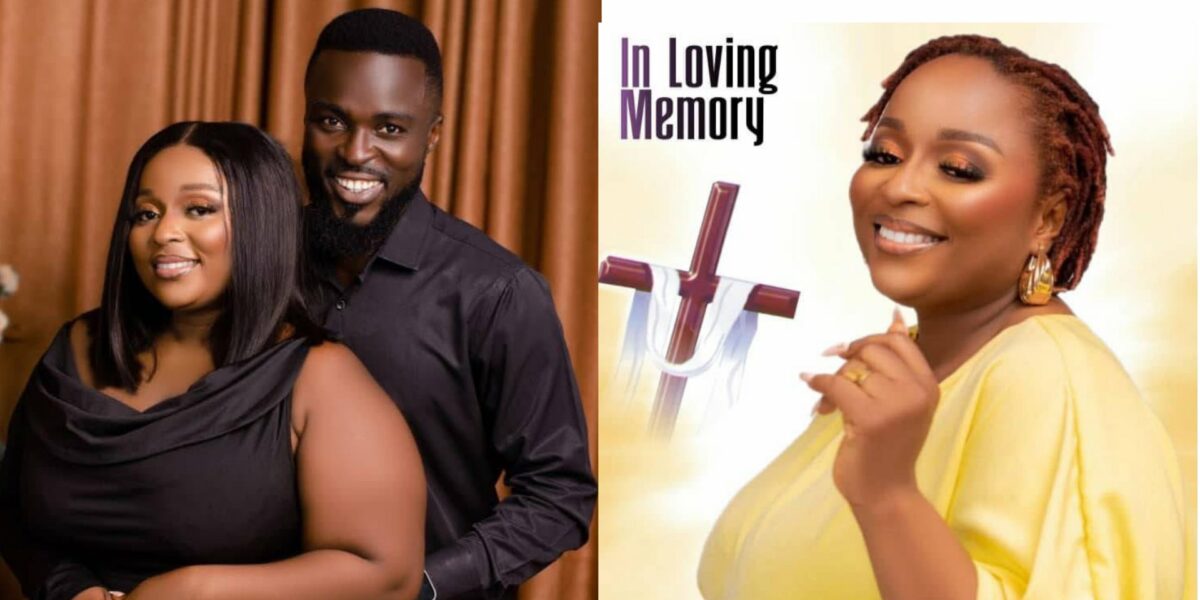A tragic story of love, betrayal, and profound loss has captured attention across Nigeria and West Africa, sparking important conversations about marriage, mental health, and the power dynamics behind closed doors. Reports have emerged online and across social media regarding the mysterious passing of Doosuur Henrietta Agbatar, who died shortly after revelations of deep marital infidelity involving her husband and one of his so-called “groomsmen” came to light.
The details first surfaced in a Facebook post by Shamimi Anase, a netizen who claims close ties to those involved and who has shared what she describes as an inside account of Doosuur’s final days.
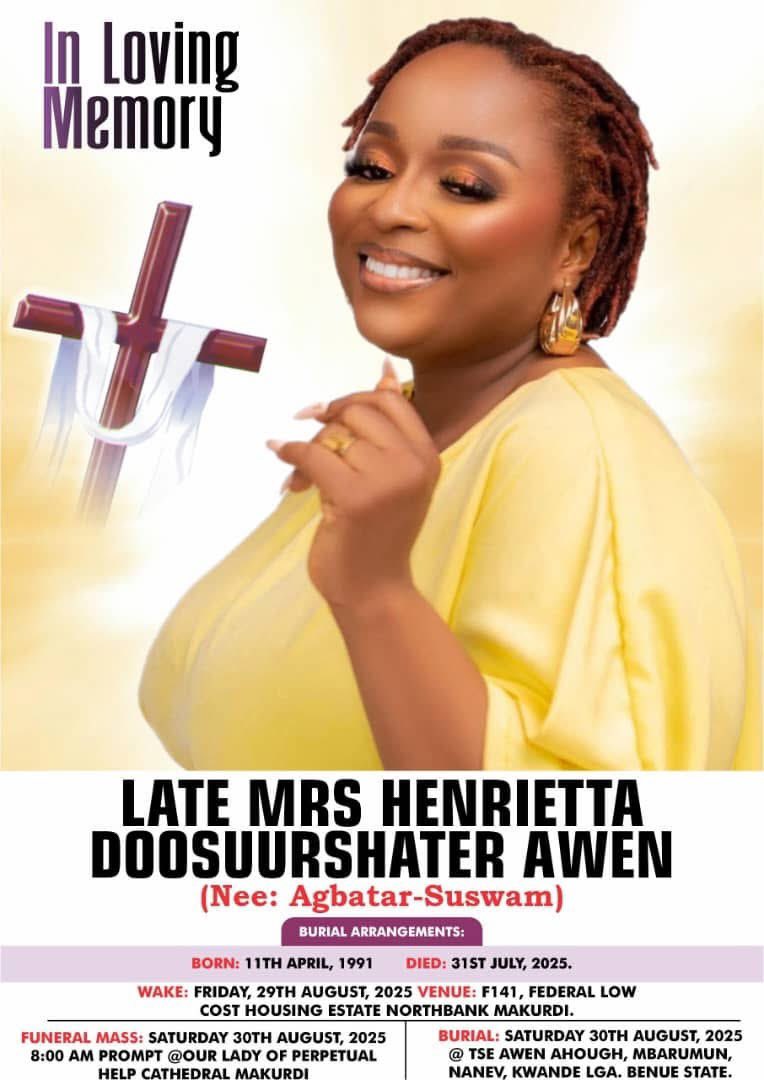
According to multiple online accounts attributed to friends and colleagues, Doosuur’s health began to deteriorate after she encountered a series of distressing marital issues involving her husband Sefa Awen.
Investigations by those close to the family suggest that Doosuur’s discovery of her husband’s romantic relationship with a woman named Loveth—who had participated in their wedding train as a “groomsman”—contributed to the severe emotional distress that led to her developing high blood pressure.
What truly happened to our dear friend, Doosuur Henrietta Agbatar?
Here is a summary of the facts as presented by those who knew her best.
In the week preceding her death, Doosuur reportedly complained about persistent chest pain and difficulty breathing, symptoms that put her in and out of medical care. On the evening of July 31st, 2025, her husband, Sefa, picked her up after work, finding her so weak that she could barely stand or walk. Rather than immediately taking her to hospital, it is alleged he brought her home instead.
Sources allege that Sefa had a pattern of dismissing her medical complaints, accusing her of exaggeration simply to gain his attention. Official records suggest that by 7:40pm that evening, Doosuur was brought to the hospital unresponsive. Another family associate, Barrister Joe, arrived shortly before 9pm and noticed she was already cold to the touch. A nurse confirmed she had been deceased for some time. According to Dr. Uzer, a medical professional familiar with the case, he had been contacted via her phone around 7:18pm to provide a prescription. Roughly thirty minutes later, her body was transported to him lifeless. No further clarity has yet been provided regarding what occurred from when Doosuur left work with her husband at 6:30pm to her hospital presentation at 7:40pm.
Those closest to Doosuur insist that these tragic events cannot be separated from the pattern of emotional neglect and betrayal she reportedly experienced throughout her eleven months of marriage.
Further accounts indicate Sefa was financially and emotionally manipulative from the onset of their union. He allegedly convinced Doosuur to transfer her mother’s Toyota Highlander to him, sold it without disclosure, and did not replace it as he promised, instead buying a car in his own name. He is also said to have requested a ₦4 million loan from an NGO Doosuur managed, using it for personal investment, and pressured her to support his business ventures, including setting up a laundry for him in North Bank.
Within weeks of marriage, Sefa reportedly pushed Doosuur to resign from her leadership position in their family-run NGO, allegedly aiming to assume control himself. Having once been her employee, some say he openly boasted about ‘conquering’ his boss, presenting wedding invitations with pride. Nonetheless, Doosuur confided in colleagues that Sefa threatened her, warning that exposure of their troubles would end their marriage. She asked trusted friends to keep these details hidden even from her own family.
The emotional strain reportedly culminated in public displays of infidelity, with Sefa flaunting his relationships, even making calls to other women while at home. In January 2025, Sefa allegedly proposed a secret marriage to Loveth Orva, also known online as Love Loveth, a woman who had previously been romantically linked with Sefa’s brother, David Awen. It was during this period that Doosuur uncovered evidence of the affair—first through a family dispute and then by viewing WhatsApp conversations she secretly recorded, which she intended to use in divorce proceedings.
The impact of these events, as described by those close to Doosuur, was devastating. Imagining the pain of witnessing your spouse live a double life, yet feeling unable to confront him out of fear—her health suffered deeply. Sources claim she developed hypertension within three months of marriage.
More details indicate that Loveth reportedly spent the night before the wedding with Sefa in the same hotel. On the morning of the wedding, she helped him dress, sent a message wishing him well, and took on the unusual role of “groomsman” as part of the ceremony. Even after the couple’s nuptials, Sefa is alleged to have left his new wife alone in their hotel suite to be with Loveth, only returning in the morning.
Determined to uncover the truth, Doosuur is said to have discovered messages exchanged between Sefa and “Anshawa” and “Lyuba”—aliases she later traced back to Loveth through her dual identities and mobile numbers.
Given such circumstances, is it any wonder Doosuur’s health declined under the strain?
In March 2025, accounts suggest Doosuur collapsed at home, with Sefa allegedly ignoring her pleas for help until a third party, Barrister Joe, intervened and instructed him to take her for medical care. Private diary entries reportedly show that Sefa scolded her for reaching out to her brother, accusing her of trying to implicate him in her worsening condition.
Despite ongoing challenges, Doosuur reportedly urged those supporting her not to confront Sefa, insisting they were seeking marital counselling from Mrs. Victoria Daor. The counselor, aware of the situation’s severity, is alleged to have advised that if Doosuur were her daughter, she would insist she leave the marriage rather than remain in harm’s way.
At one point, as her situation worsened, a friend offered to help her move out, but Doosuur pled for more time, stating progress was being made. She cited occasions when Sefa attempted to reconcile, such as a visit to Mango World for a photoshoot. However, those familiar suggest such gestures did little to address the root issues.
The reaction following Doosuur’s passing has intensified public scrutiny. Just hours after her death, Sefa reportedly convened a meeting at the NGO, announcing, “As you all know, Madam is officially dead now. I am now in charge and work must continue.” This, some feel, revealed his priorities and raised further questions about compassion and suitable conduct during mourning.
Amidst growing tension, Pastor Awen publicly accused Barrister Joe of invading the family’s home and seizing assets. Yet, it has been clarified that the apartment in question belonged to Doosuur, and the items retrieved were organisational property (such as incorporation documents, bank-related phones, computers, and devices for the NGO). Prior to retrieval, Barrister Joe reportedly informed both Sefa and Pastor Victor of his intentions, with Sefa and a friend present during collection—contrary to claims of unauthorized entry.
To some, Pastor Awen’s public statements emphasizing “compassion and process” while allegedly ignoring the long pattern of abuse, infidelity, and opportunism amounts to an erasure of Doosuur’s suffering and a failure to recognize the real causes of her tragedy. Friends remain determined to share Doosuur’s story and honor her legacy, vowing that her truth will not be hidden alongside her body.
Diaries and supporting documents reportedly demonstrate that the broader Awen family was aware of the situation even as events unfolded. Friends involved in the matter feel a duty to share these records publicly so that others may learn from Doosuur’s ordeal.
While the official cause related to heart failure and depression, close associates argue that the emotional trauma caused by both Sefa and Loveth was ultimately fatal. These tragic events have sparked difficult questions: If Sefa was a loving husband, why do Doosuur’s private writings mainly recount suffering? How did family dynamics contribute to her fate?
The broader community insists that her memory deserves respect, and that sweeping the circumstances of her death under the carpet will only endanger others at risk of similar exploitation or abuse. Friends emphasize that, although their efforts cannot bring Doosuur back, they hope to prevent future tragedies by sharing what they know and supporting others in similar positions.
Plans are underway to release additional documentary evidence in phases as part of this effort to drive awareness and spark societal change.
May the memory of Doosuur inspire honest conversations and help protect others from suffering in silence. 🙏
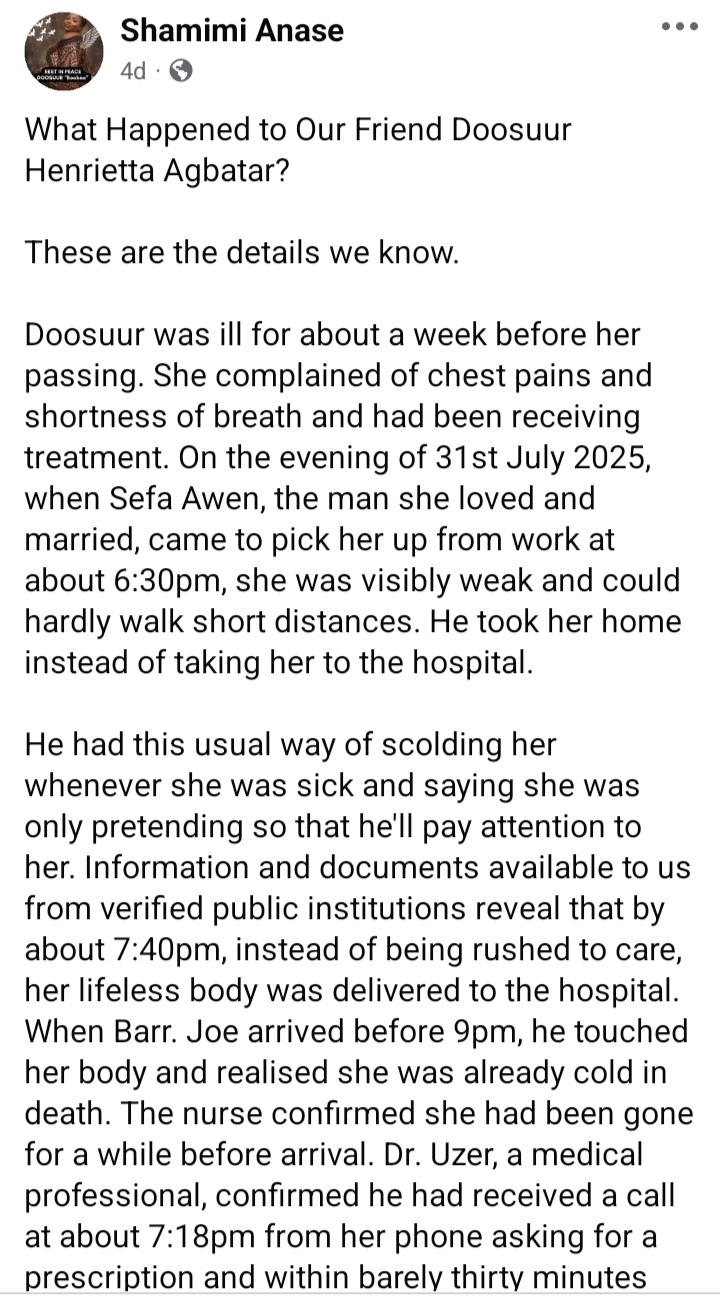
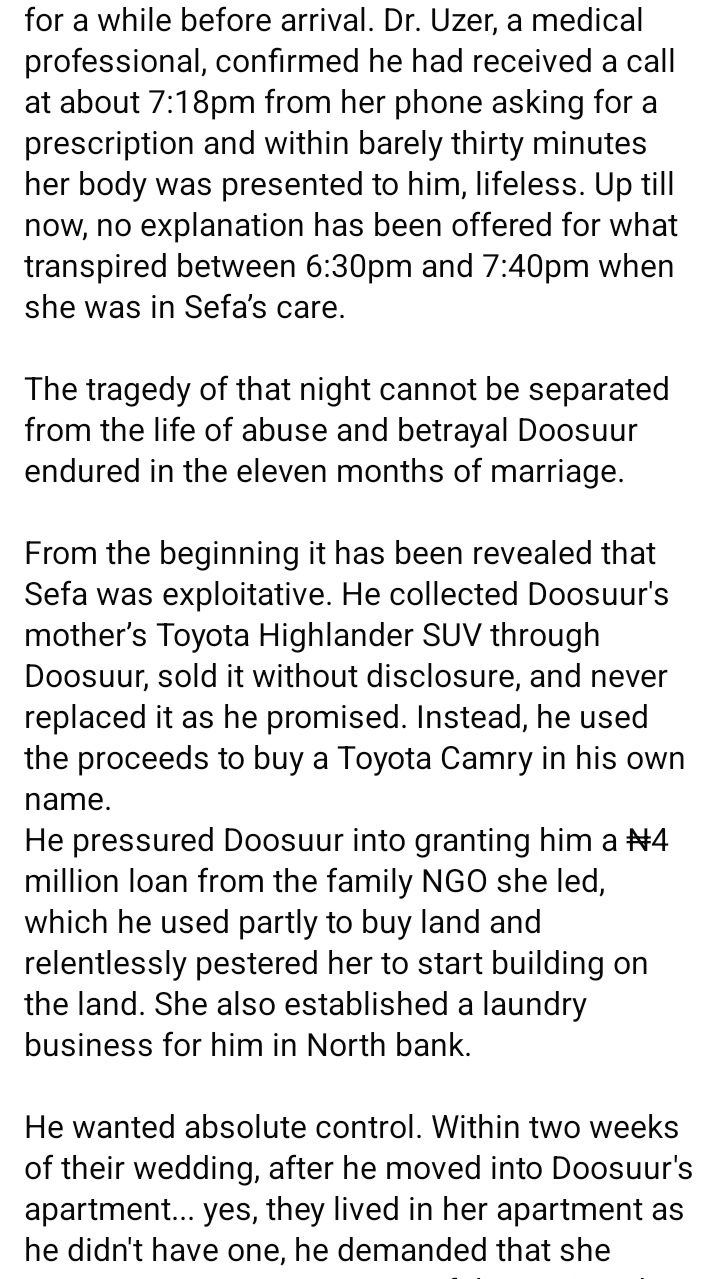
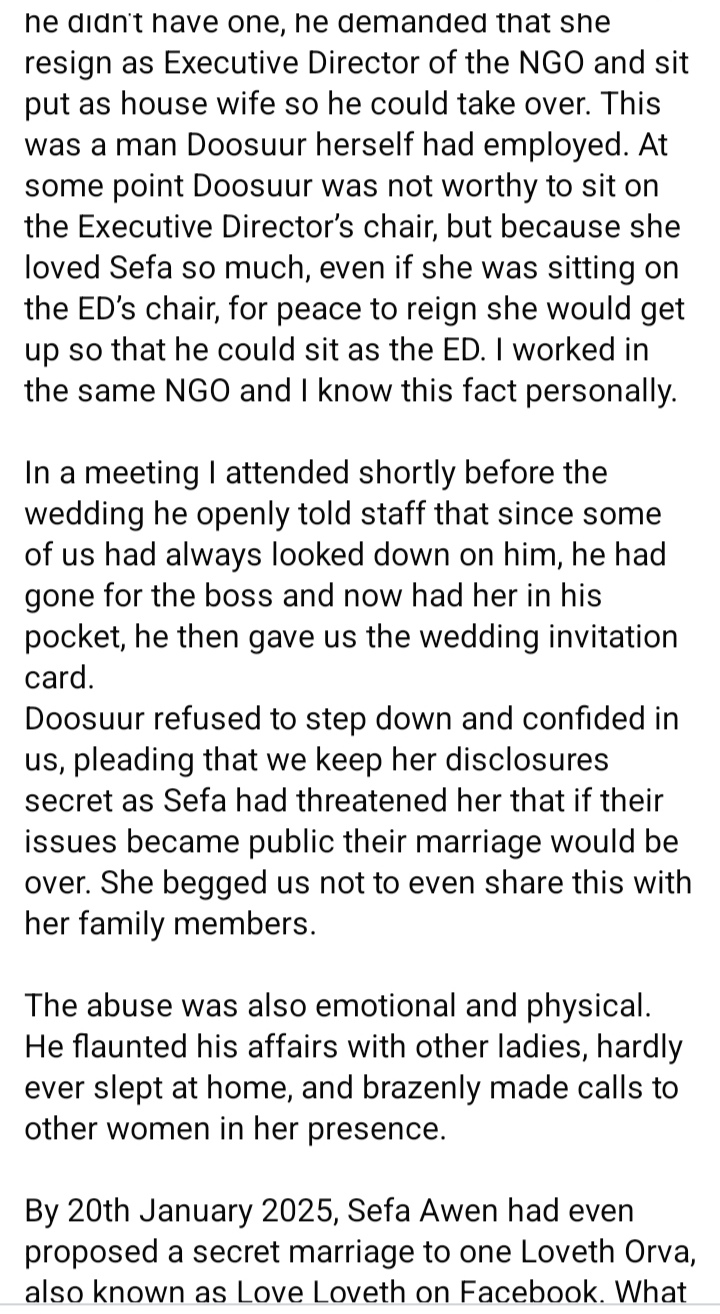
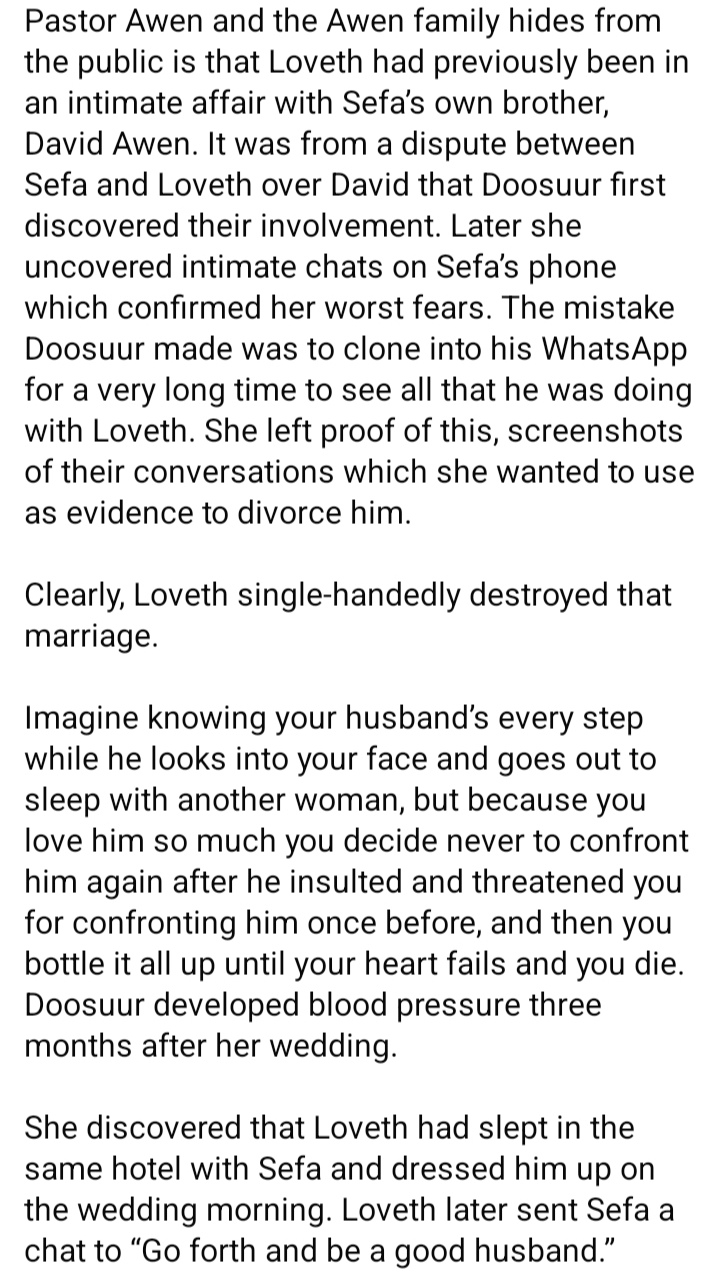
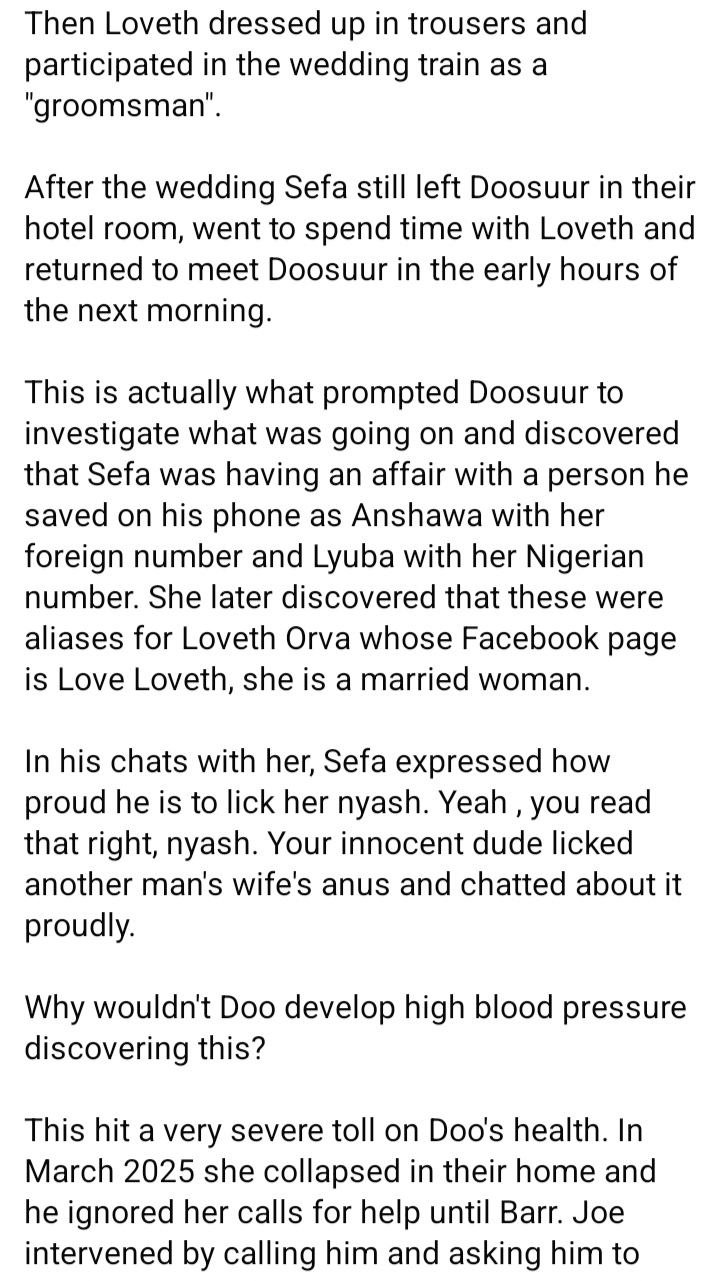
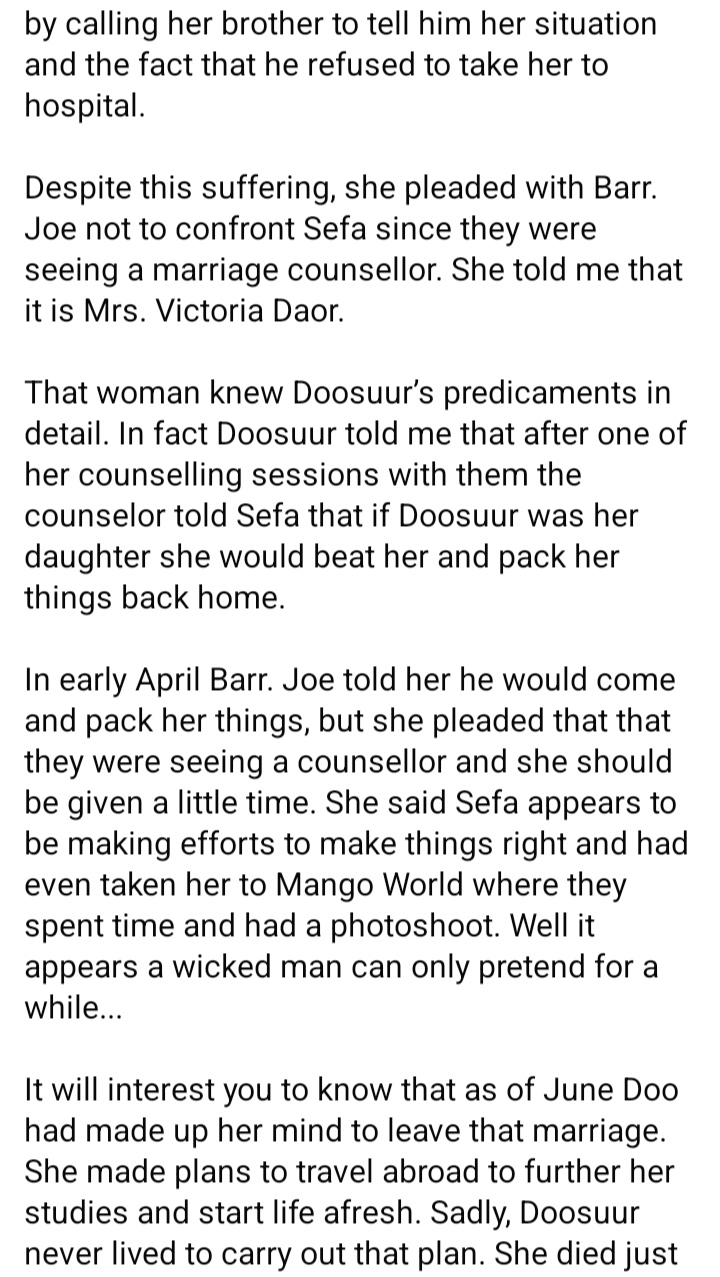
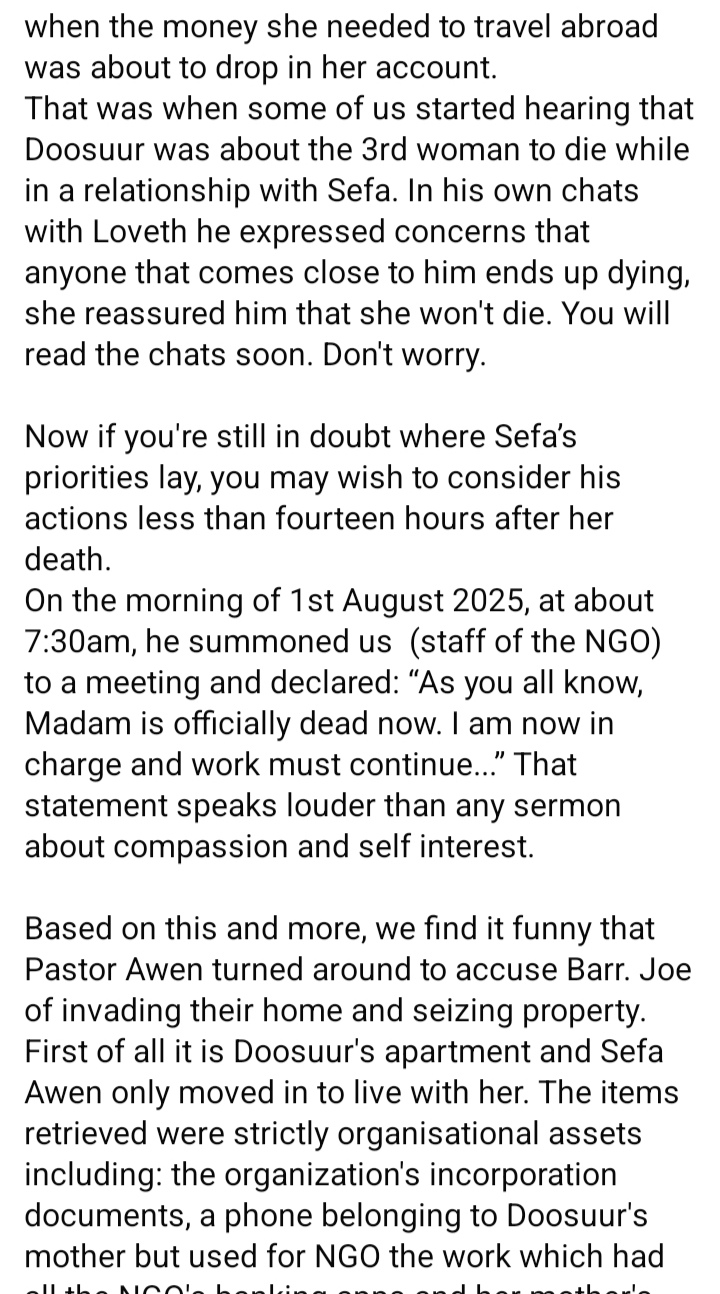
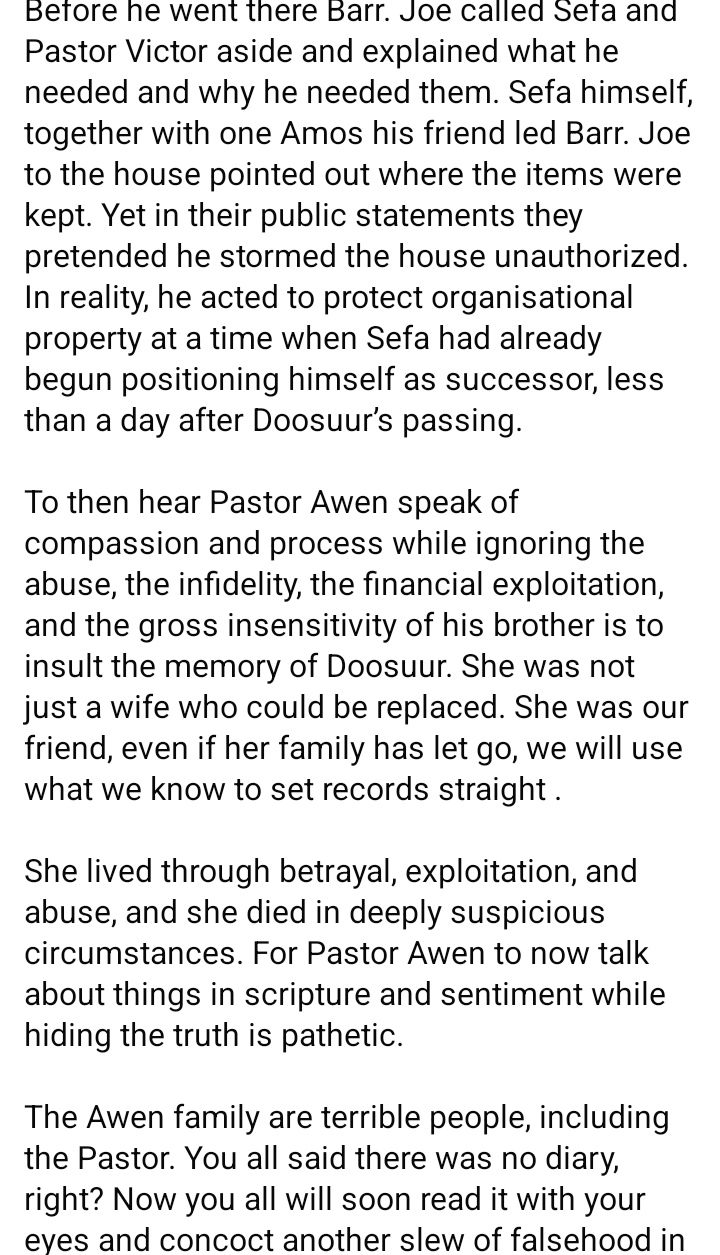
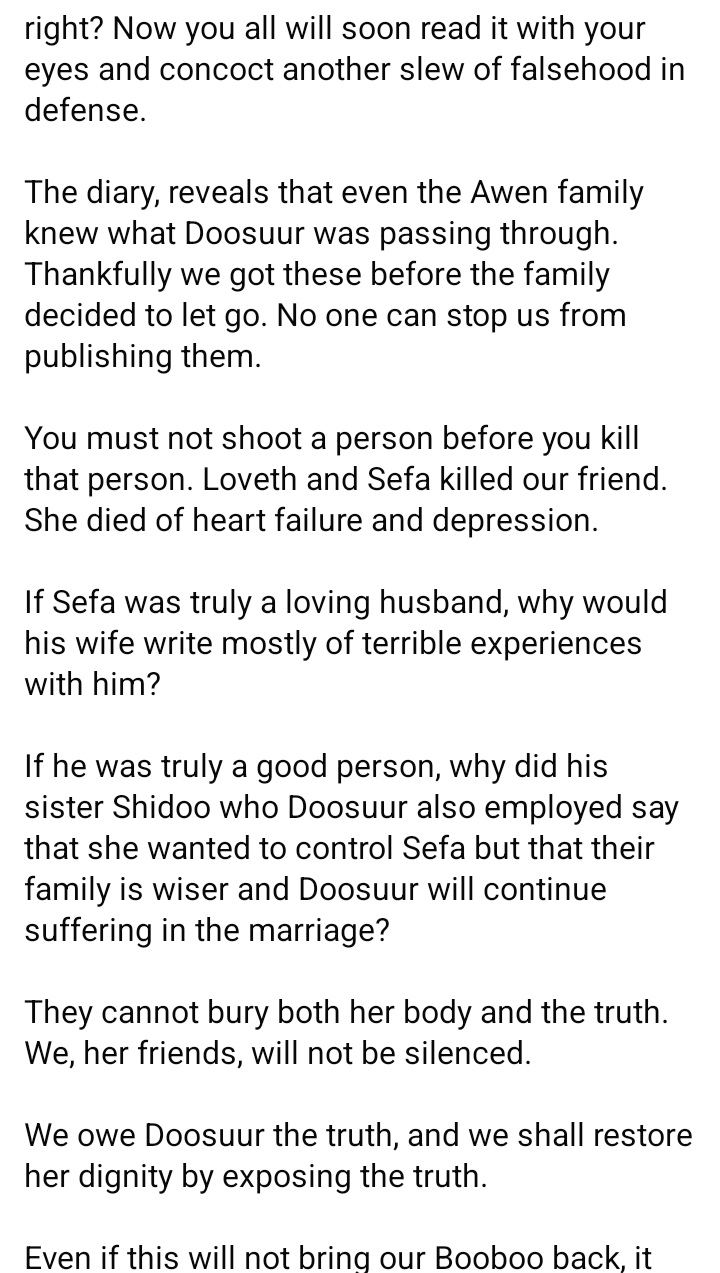
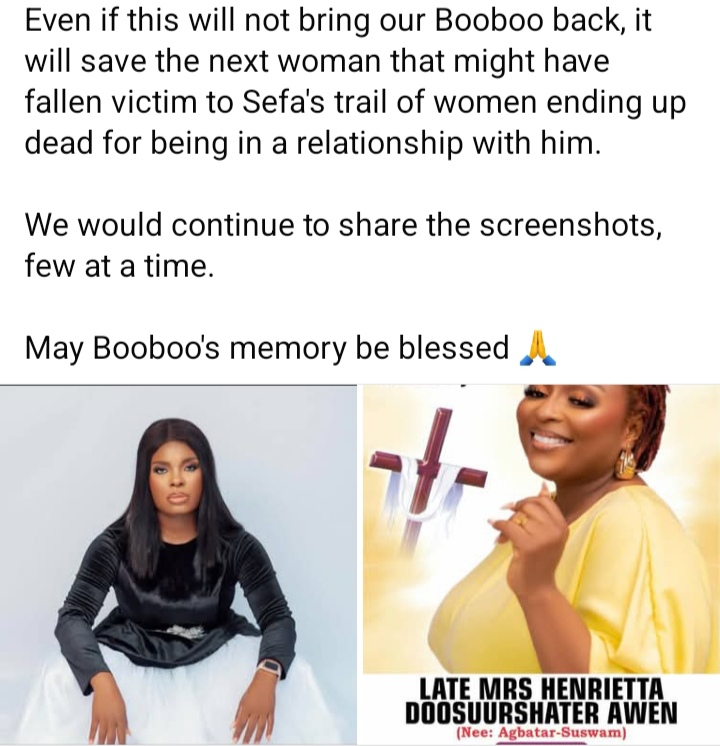
What are your thoughts on how families, friends, and communities can better support those enduring challenges in their relationships? Do you know someone who has faced a similar struggle, or have advice on where people can find help?
Share your perspective below, or send your stories in confidence to story@nowahalazone.com — NowahalaZone values your voice.
For food-related inquiries, contact food@nowahalazone.com
For general support: support@nowahalazone.com
If you have experiences or insights to share, or need support for a story, reach out to us. NowahalaZone buys stories and offers a safe space for your voice.
Follow us on Facebook
Follow us on X (Twitter)
Follow us on Instagram

